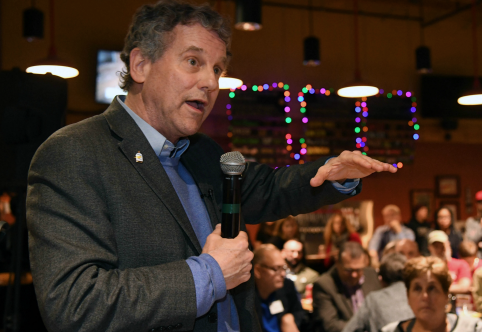Democratic senator Sherrod Brown (Ohio) downplayed his history of siding with organized labor against comprehensive immigration reform while touring Nevada over the weekend.
"I call myself a labor Democrat, as all Democrats should call themselves," Brown told members of Culinary Workers Union Local 226 in Las Vegas on Saturday. The union, which represents more than 57,000 hospitality workers from 173 different countries, is both Nevada's largest labor organization and its biggest immigrant advocacy group.
Local 226's outsize influence among Nevada's burgeoning Latino community, which constitutes nearly 30 percent of the state's population, is likely the reason why Brown prioritized immigration in his remarks. The senator, who is weighing a 2020 presidential campaign as he tours the early caucus and primary states, has refrained from discussing the topic in depth during earlier stops in Iowa and New Hampshire.
"Immigrants and the union movement are the strengths of our country," said Brown, flanked by banners that read "No Ban. No Wall. No Raids," according to the Nevada Current. "It's why we're a great country, it's why people still have an opportunity if they're lucky to carry a union card, and it's my commitment to you."
When questioned by those in the attendance, Brown lambasted the Trump administration's migrant separation policy and argued for comprehensive immigration reform that included a fix for "DACA kids" and a pathway to citizenship for illegal aliens.
The rhetoric, however, contrasts with one of Brown's acts as a freshmen senator. In 2007, Brown joined an ideologically diverse group to kill a comprehensive immigration reform proposal championed by the late senator Ted Kennedy (D., Mass.). If implemented, Kennedy's bill would have established legal status and a pathway to citizenship for nearly 12 million illegal aliens. In exchange for amnesty, the legislation provided for enhanced security on the U.S.-Mexico border, including 20,000 additional border patrol agents and more than 300 miles of fencing.
Apart from granting amnesty, the bill was also controversial because it created a new guest worker visa program for temporary nonseasonal laborers across all economic sectors. Response to the program, which as initially proposed would have allowed businesses to import 400,000 temporary workers per year, was split among organized labor.
Traditional labor groups based around manufacturing and industry, like the AFL-CIO, opposed the program for fear it would adversely impact their members, who were already hampered by globalization. Service industry unions, like the SEIU and UNITE HERE—with which Local 226 is affiliated—backed the program as it was popular with their membership, composed primarly of low-skill workers.
Brown, who has accepted nearly $2.5 million in campaign donations from traditional labor groups throughout his career, sided with the AFL-CIO. Before voting to kill the entire immigration reform package, Brown supported efforts to chip away at the visa program piece by piece. The senator voted in favor of lowering the number of visas granted per year from 600,000 to 200,000 and endorsed an amendment to end the program after five years.
Although Brown made few public statements regarding the legislation, the sentiment of many liberals allied with the AFL-CIO was expressed by Sen. Bernie Sanders (I., Vt.), who argued America needed to "increase wages ... not lower them."
"At a time when the middle class is shrinking ... it makes no sense to me to have an immigration bill which ... would bring millions of 'guest workers' into this country who are prepared to work for lower wages than American workers," Sanders said shortly after joining Brown to defeat the measure.
Brown's Senate office did not return requests for comment for this story.
